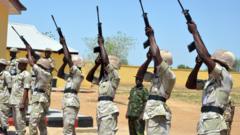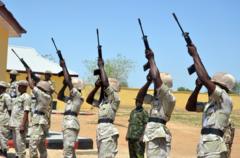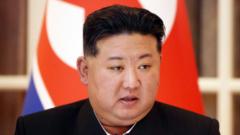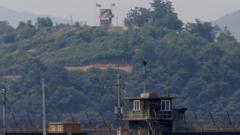Anastasia Samsonova recounts her trip to North Korea's Wonsan Kalma, a resort marked by tight security and surreal beach experiences, amidst reports of forced labor and human rights concerns.**
Exploring North Korea's Exclusive Coastal Resort: A Glimpse into the Unconventional Holiday**
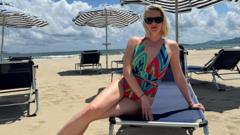
Exploring North Korea's Exclusive Coastal Resort: A Glimpse into the Unconventional Holiday**
North Korea's Wonsan Kalma Coastal Tourist Zone offers a unique experience with strict regulations for tourists.**
Last month, Anastasia Samsonova, a 33-year-old human resources worker from Russia, embarked on a tightly monitored vacation to a new holiday resort in North Korea, the Wonsan Kalma Coastal Tourist Zone. Opened on July 1, the resort showcases luxury amenities such as hotels, restaurants, and a water park, nestled not far from a missile testing site, where North Korean leader Kim Jong Un spent his formative years.
Initially expected to welcome international visitors, the resort has thus far permitted only organized groups of Russian tourists, accompanied by security personnel throughout their stay. Anastasia was part of a limited group and described the experience as far from a typical beach holiday. Guides explained that the presence of guards was to prevent misunderstandings with locals, as they remained curious and surprised by the foreign visitors due to North Korea's historical isolation.
While restrictions were in place, including mandates against revealing attire and prohibitions on photographing certain sites, Anastasia found the beaches impressive, revealing an immaculate landscape that felt almost untouched. "The loungers were absolutely new, everything spotless," she shared, noting the serenity and cleanliness of the location.
The Wonsan Kalma resort, inspired by Spain's Benidorm, is part of Kim Jong Un’s broader initiative to boost tourism in North Korea. However, its development has drawn scrutiny from human rights organizations concerned about the alleged exploitation of workers during its construction.
Despite pandemic-related tourism limitations, North Korea began selectively allowing Russian tourists last year, promotion appealing to those seeking something exotic. Yet uncertainty surrounds future tourist access to Wonsan Kalma, as North Korean authorities maintain control over this selective tourism flow.
The cost of a week-long trip to the resort steeply exceeds the average Russian salary, yet interest persists, with reports of Russian agencies promoting potential tours. While the landscape may draw tourists, the resort’s offerings remain mired in controversy over the treatment of the workforce that built it, reflecting the complexities underlying North Korea’s tourism sketch.
Anastasia, undeterred by the constraints of her recent trip, expressed hopes to return next year, possibly exploring the rumored ski resort nearby. Her experience encapsulates the juxtaposition of an idyllic beach escape and the harsh realities that underpin North Korea's tourism industry.

